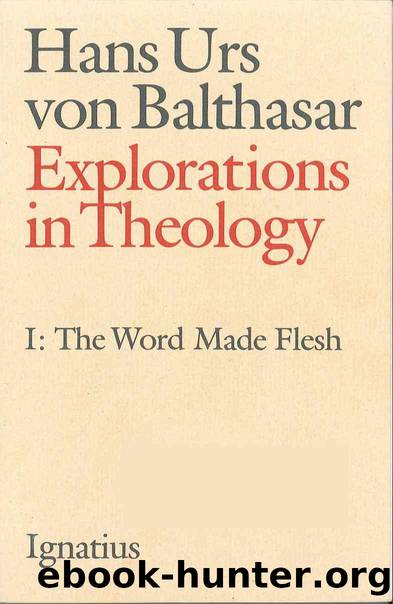Explorations in Theology I: 1 by Hans Urs von Balthasar

Author:Hans Urs von Balthasar [Balthasar, Hans Urs von]
Language: eng
Format: epub
Tags: Spiritual & Religion
ISBN: 9780898702651
Publisher: Ignatius Press
Published: 2011-11-17T05:00:00+00:00
2
From what we have said above, many conclusions follow regarding the structure of theology. In the first place, a general truth: that in theology all that has to do with the finite aspect of the Word (with concepts, images, the letter) must be considered solely a means to reaching the infinity incarnated therein. There is urgent need of a thorough investigation into the formal logic of the mode of speech and thought of the Word of God. This would of necessity bring out how the formal laws of human speech and thought are in no way superseded, but rather carried up to a higher plane, since all the laws applying to what is finite become functions of a truth infinite in every âpartâ or manifestation, and not susceptible of being parceled into finite dictums and laws. Such an investigation would bear many points of resemblance to that of Bultmann, and yet would be very different. It would not approach the Word of God through any philosophic, existential presuppositions, but would be developed from the basic fact of the incarnation (accepted in faith). It cannot be said that, through the incarnation, or even through the resurrection, human âfleshâ (human nature with all its laws of finite being and thought) has been ârelativizedâ. That would be, once again, a category of this world, finite and wholly inadequate for this absolutely unique, unparallelled event. This is why modernism, though often near the mark, was basically off-target.
Neither history nor evolution nor philosophy has the Word for its province, but faith alone, which requires that theology be presented in such a way as to foster a more profound spirit of adoration, a more exact obedience in practice. The theologian, therefore, is required to apply the laws of human thinking in such a way as to bring out clearly the law of faith. The laws of thought are primarily concerned with drawing limits, defining, even if this is done so as subsequently to interrelate more precisely the fields thus delimited. So long as the various contents of truth are themselves finite, there is nothing to object to in this process of defining and contrasting. The case is otherwise when the laws of faith come into action, for then the truth comprised within the drawn limits is the same (not only genetically, but substantially and personally) as the truth outside them. The drawing of the boundary does not involve falsehood (for it is all part of the movement of the Wordâs incarnation), provided that one is always aware of the presence, within the boundary, of the unbounded, the presence in the concept of what is beyond concept, in the definition of the presence of the divine object of faith. And this applies even more to the subsequent operations in which this first delimited sphere (of infinite content) is brought into relation with others (also of infinite content).
In other words, every concept in theology must be catholic, universal, which means it must present the whole truth, either by
Download
This site does not store any files on its server. We only index and link to content provided by other sites. Please contact the content providers to delete copyright contents if any and email us, we'll remove relevant links or contents immediately.
Christian Ethics by Wilkens Steve;(854)
Christian Ethics for a Digital Society by Kate Ott(774)
Fearfully and Wonderfully Made by Philip Yancey & Paul Brand(755)
God and the Multiverse by Victor J. Stenger(665)
Numbers by Ronald B. Allen(629)
How to Read Slowly by James W. Sire(608)
Christian Ethics: An Introduction to Biblical Moral Reasoning by Wayne Grudem(589)
The City of God by Saint Augustine & Marcus Dods(565)
Morality by Jonathan Sacks(564)
Monastic Archaeology by Unknown(558)
The Technological System by Jacques Ellul(542)
Amish Grace by Donald B. Kraybill & Nolt Steven M. & Weaver-Zercher David L(521)
The Disabled Church by Rebecca F. Spurrier;(516)
Jesus: A New Vision by Whitley Strieber(512)
Death of the Doctor by Unknown(512)
Children of Lucifer; The Origins of Modern Religious Satanism by Ruben van Luijk(503)
Critical Writings by Joyce James;(499)
Redeeming Sociology by Vern S. Poythress(476)
The Church in the Early Middle Ages by G.R. Evans(464)
